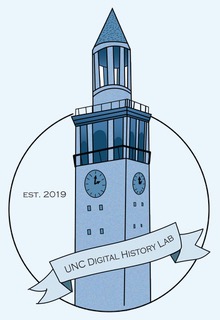 The Digital History Lab’s second year has been a productive and rewarding one. With a staff of four, the DHL has continued one podcast and started another, offered tutorials and workshops, produced a weekly newsletter highlighting tools and events relevant to digital history, and conducted regular consultations as we continue to deal with the implications of teaching in the time of COVID-19.
The Digital History Lab’s second year has been a productive and rewarding one. With a staff of four, the DHL has continued one podcast and started another, offered tutorials and workshops, produced a weekly newsletter highlighting tools and events relevant to digital history, and conducted regular consultations as we continue to deal with the implications of teaching in the time of COVID-19.
In Summer 2020, the lab created and edited the blog, Teaching History Online. This blog contains posts by educators and students about their experiences during remote instruction in the Spring 2020 term. It is designed as a resource for teachers at all levels as they continue to be ready for online or hybrid instruction.
DHL staff assisted several faculty members and graduate students implementing digital tools into their teaching. The directors worked with students and Professor Katherine Turk in HIST 179H, “Women in the History of UNC Chapel Hill” on the creation of a map and podcast to accompany their digital exhibition, “Climbing the Hill: Women in the History of UNC.” The DHL also continued their support of Dr. John Sweet’s “Historic Chapel Hill” project and collaborated with Dr. Daniel Cobb and his undergraduate research team on a story-map, “More Than a Trip,” documenting the travels of Native American author D’Arcy McNickle.
The DHL continued and finished its work on its inaugural podcast, The Lens: Historians and Popular Media. The lab produced eleven total episodes of The Lens. The DHL has also launched its new podcast, “The Cutting Room Floor,” which allows historians to share engaging, entertaining, or even puzzling stories found during research that did not make the cut for larger projects. Episodes are produced with professional recording quality and an immersive audio experience.
The DHL also redesigned the History Department Website. Emma Rothberg and Craig Gill worked in consultation with faculty to make sure all pages were accurate, inviting, and accessible. Part of this website update project was the creation of a History of the Department timeline, by Joshua Michael O’Brien (Class of 2022).
The Digital History Lab organized several events for undergraduates, graduate students, and faculty across the university in the academic year. Over Summer 2020, Gabriel Moss held two short, introductory courses to GIS. In these hands-on, online workshops each participant produced an original mapping project and shared it with other participants. In total, the courses taught fifteen graduate students in multiple departments the fundamentals of Google Earth, QGIS, and ArcGIS Online. Everyone who participated was greatly supportive and enthusiastic about the class, and plans are underway for continued courses in historical GIS in the next academic year.
In Fall 2020, the lab also hosted two major workshops. The first, in coordination with Wilson Library staff, discussed the classroom and personal uses of Omeka, a free, flexible, and open-source web-publishing platform for the display of library, museum, archives, and scholarly collections. The second was led by Craig Gill and focused on Zotero as a research resource and a bibliography database. These workshops focused on exposing faculty and students to new technologies and ways to use them in their teaching and research. Both workshops provided easy-to-follow tutorials and recordings were made available to those who could not attend the live webinar.
The DHL started its Working Group in Fall 2020. Meeting roughly every two weeks, the Working Group was both a resource and a workshop for those in who are interested in learning more about and collaborating on digital humanities projects. The DHL Working Group had consistent attendance by both faculty and graduate student members. Meetings in the Fall consisted of short technology tutorials, while meetings in the Spring focused on sharing and getting feedback on personal digital humanities projects.
Finally, the DHL has major plans for Fall 2021. We plan to host a workshop on “Podcasting for the Classroom,” which will be led by Ash Curry (Class of 2022). The DHL will continue to record and produce episodes of “The Cutting Room Floor” as well as hold workshops and Transcribe-A-Thons as COVID-19 protocols allow. The DHL has also begun plans for a Triangle public and digital history website that will showcase the work being done by faculty, students, and community partners. As a first step, the DHL created a blog page on our website where UNC students and faculty can share and discuss completed and ongoing digital projects.
The DHL was co-directed by Emma Rothberg, Craig Gill for 2020-2021. Ash Curry was an invaluable contributor as an undergraduate research assistant and podcast guru. Gabriel Moss was an indispensable consultant to the lab.
Thanks for reading!
Emma Rothberg and Craig Gill
